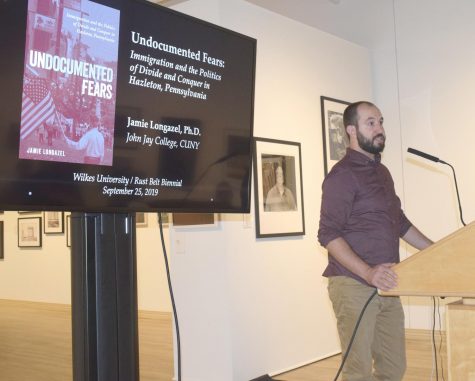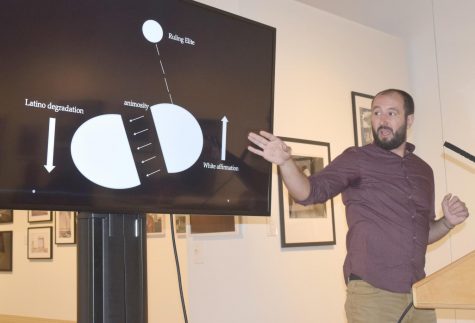Art in Context: “Undocumented Fears”
On Sept. 25, Jamie Longazel, associate professor in the department of political science at John Jay College of Criminal Justice, presented in the Sordoni Art Gallery to accompany the Rust Belt Biennial.
The Rust Belt Biennial Exhibition has been running since early September and focuses on photography taken throughout the Rust Belt, meant to highlight the struggles and pride of the people who live throughout the region.
Longazel’s lecture, “Undocumented Fears: Immigration and the Politics of Divide and Conquer in Hazleton, Pa.,” focused on the passing of the Illegal Immigration Relief Act (IIRA) in Hazleton in 2006. Longazel’s book uses the politics around the IIRA to look at the mechanics of contemporary divide and conquer politics that often impact the Rust Belt region.

Longazel broke down the title of his book discussing how “Undocumented Fears” represents three different meanings.
“The first is the obvious reference to people who are in the country without authorization and how those folks were targeted, and the fear that existed in the community was directed at them.”
“The second,” Longazel continued, “is a reference to the undocumented allegations that were levied against these folks.
“Finally and I think most importantly it is a reference to a deep fear that we in the Rust Belt have as we watch our surroundings crumble.”
Longazel addressed the myth that undocumented immigrants commit more crimes than other citizens.
Instead, he addressed an important and overlooked problem, that native-born people have a fear and anxiety that are derived from the economic decline they face.
“It is an existential fear, it is scary to watch how the ideals that so many of us have internalized and embraced, that if you just work hard you will succeed and everything will be fine. To watch that turn from gospel to myth I think is a really powerful feeling,” Longazel said.
Longazel spoke about how people in power have used that fear to separate the working class and turn them against one another.
He explains that a ruling elite class has taken the money from working-class areas and siphoned that wealth into their own pockets.
Once they do, Longazel explains that they divide the working class by race: by painting a false picture of immigrants who come into communities by saying they take the jobs and money of the native-born citizens.
Longazel spent a major portion of the lecture discussing the long history of job decline in Hazleton and how in the 1980s the Reagan administration cut funding for community development federal grants.
This resulted in a loss of funding for those community organizations in both Hazleton and across the country. These used to attract industry to those working-class areas. According to Longazel, Luzerne County has lost 50 percent of its manufacturing jobs since 1980.
Community organizations fought for these jobs, but when funding was cut they had no choice but to turn to the Keystone Opportunity Zone (KOZ) Initiative. The KOZ is a state-level law that gives tax breaks to businesses that promise to open on land that is designated to bring industry to working-class areas.
The problem Longazel addresses is that businesses can, before the 12-year time period where the business is designated to pay money into the community, leave the area and pay no money.
To many, this seems fair and reasonable in the free market environment of the United States, until Longazel points out that the money the business would pay were planned to go towards parks, infrastructure and other aspects of the communities.
“To give you an example, the Hazleton Area School District needed to agree to give up $1 million in discretionary revenue each year for KOZ to happen. The school board signed off thinking this would attract jobs,” he said.
KOZ allowed for companies to not pay taxes while the community lost money paying into KOZ with the hopes that it would bring more jobs to the area. As new job opportunities opened up there was an influx of immigrants who, just like native residents to the area, were looking for job opportunities.
The working class, both native and immigrant, shares practically identical interests, according to Longazel.
The only problem he highlights is that the ruling elite and corporations paint immigrants as criminals and divide the working class by blaming the working class’s problems on immigrants.

Longazel uses this chart to explain the divide between the working class created by the “elite.”
Brianna Schunk, senior English and individualized studies in dance major thought the most interesting part of the lecture was the divide of the working class and its relation to race.
“My dad is someone who I’ve had this discussion with often,” said Schunk. “I always try to explain that everyone in the working class, regardless of their race, is working toward the same thing.”
Schunk continued, “I really wish he had been here to hear this lecture, I think, regardless of your political affiliation, that this topic and the process that led to such an atmosphere of fear around a failing economy is something that people should listen to and be aware of.”
Longazel finished his lecture with a central point, “I think what we do in our conversations around immigrants is fight, we say ‘that is racist, you can’t say that’ and argue back and forth, but what I want to emphasize is that this is tapping into the anxiety and fear that I started out with. Hazleton does have a terminal illness, and it looks like that.”
Longazel proceeded to point towards a chart that showed job loss in Luzerne County.
During the question and answer portion of the lecture, Dr. Helen Davis, associate English professor at Wilkes University, expressed her concern that there is a difference in how working-class white citizens and working-class citizens of color are treated. The concern being that people of color still face discrimination and racism and that by viewing the working class as one those problems might be overlooked.
Longazel expressed that he and Anthracite Unite, a collective of scholars, artists and activists working on issues of racial and economic justice in Northeast Pennsylvania, make sure to be aware of the “double oppression” people face due to race, gender and sexuality.
Longazel expressed that his research should not be attributed to one political party or the other, but instead is meant to showcase the larger problem rooted in our economics and politics.
Sean is a sophomore communication studies major who started as a staff writer in the fall of 2018. Sean currently works as the Assistant News Editor, a...